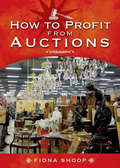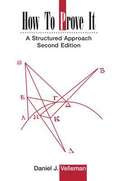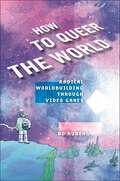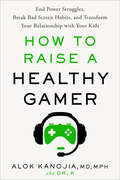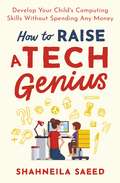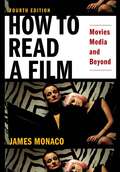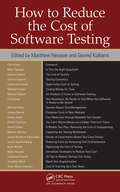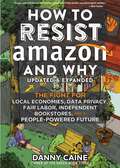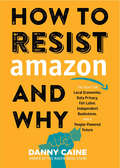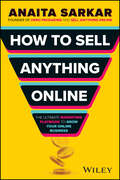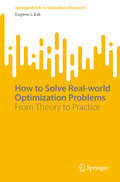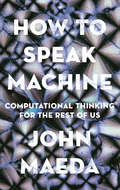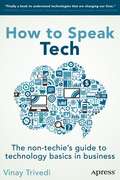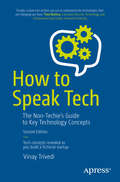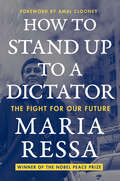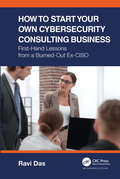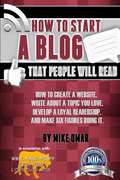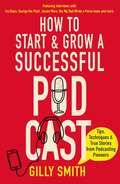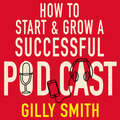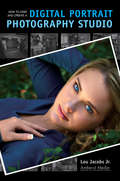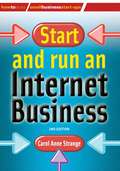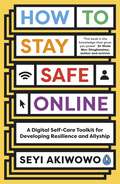- Table View
- List View
How to Profit from Auctions
by Fiona ShoopTV Programs like Bargain Hunt and Cash in the Attic have increased the publics interest in attending auctions. This invaluable guide shows all the tricks of the trade from looking for costly scratches hidden under labels when buying to negotiating for a better rate when selling, as well as how to arrange free collection and getting the best from your local auction house. Whether you want to learn how to bid so youre seen by the auctioneer or want to ensure your commission bid stands a better chance, antiques expert, Fiona Shoops advice could make you thousands. Contains a glossary to decipher common auction terms, as well as a detailed county by county auction directory with over 600 auctions listed.
How to Prove It: A Structured Approach (Second Edition)
by Daniel J. VellemanThis book helps students to develop deductive reasoning ability in general and to learn the underlying principles involved in the construction of proofs by focusing on "structured proving."
How to Queer the World: Radical Worldbuilding through Video Games
by Bo RubergWhat video games teach us about building a more inclusive worldWhat does it mean to build a world? Worldbuilding is traditionally understood as an expression of storytelling across media forms. Yet, as video games show us, worldbuilding does not necessarily need to center narrative elements. Instead, new worlds can allow us to reimagine existing structures, conventions, and constants. Doing so gives us the tools to queer the world around us.How to Queer the World argues that video games provide us with keen insight into worldbuilding. With these insights come a new understanding of the ever-elusive ideals of queer worldmaking. Video games challenge us to address how worlds are built through underlying systems rather than surface-level representation. They also offer opportunities to envision alternate and queer ways of living, loving, desiring, and being. Each of the chapters in this book presents a close reading of a video game that illustrates one way of building worlds and encoding them with meaning, focusing on elements of digital media often overlooked as technical rather than cultural.From the design of game mechanics and user interfaces to the use of graphics software and physics simulations, Bo Ruberg argues that these aspects of video games represent a critical toolkit for seeing the work of worldbuilding differently—in video games and beyond. Simultaneously, each of these video games models an approach to what Ruberg terms “queer worldbuilding.” Queer worldbuilding radically remakes the world by destabilizing the fundamental logics of our own universe: who we are, what we can do, how our bodies move, and how we exist within time and space.
How to Raise a Healthy Gamer: End Power Struggles, Break Bad Screen Habits, and Transform Your Relationship with Your Kids
by Alok KanojiaA former gamer and Harvard-trained psychiatrist offers a proven, tested plan to help parents define, set, and reinforce healthy boundaries around video games and help kids who have developed an addiction to gaming.&“I highly recommend this calm, structured, and nurturing approach to better and less screen use.&”—Tina Payne Bryson, PhD, New York Times bestselling coauthor of The Whole-Brain Child and No-Drama DisciplineHow much should I let them play? How do I get them to be interested in anything else?! When it comes to family rules around video games, most parents are at a loss. After all, our technologically invasive world is something previous generations didn&’t have to wrestle with, so we have no model for how to guide our families through the rapidly changing landscape, no blueprint for setting healthy gaming boundaries and keeping them in place. A former Harvard Medical School instructor and one of the foremost experts on video game psychology, Dr. Alok Kanojia—known as &“Dr. K&” to his millions of followers—has firsthand knowledge of this modern issue: He needed professional help to break his own gaming habits in college, an experience that fueled his interest in learning how to help others. Drawing on Dr. K&’s professional specialization in working with people of all ages and varying degrees of addiction, and the most recent research from neuroscience and psychology, How to Raise a Healthy Gamer teaches parents a new skill set for negotiating gaming culture and offers solutions rooted in the science of treating addiction, including: • An eight-week, step-by-step road map for setting, enforcing, and troubleshooting healthy gaming boundaries.• Advice on how to react when your child becomes irritable, rude, or seemingly directionless.• Essential communication strategies for reaching kids who have developed a serious gaming problem.• The neuroscientific and psychological reasons that children gravitate to video games and how to help them meet these needs in real life.• Insights and advice on dealing with behavioral issues that often accompany game use: ADHD, spectrum disorders, and substance abuse. Whether your goal is to prepare your child for a healthy relationship to technology or to curb unhealthy amounts of time spent gaming, How to Raise a Healthy Gamer will help you better understand, communicate with, and—ultimately—empower your gaming enthusiast to live their best life.
How to Raise a Tech Genius: Develop Your Child's Computing Skills Without Spending Any Money
by Shahneila SaeedTeach computing concepts without computers! How to Raise a Tech Genius makes the computing curriculum accessible for parents and families.We live in a digital world - one in which our children are surrounded by technology. It's a part of their lives in a way that even the most tech-savvy adults aren't fully able to comprehend. What we do know is that the workplace of tomorrow will require our children to harness the power behind the technology, to be able to understand key concepts and apply them. Logical reasoning, creativity and problem solving are skills that are becoming increasingly essential in the world of work. How can we best prepare our children to enter this world? How to Raise a Tech Genius is a practical book that assumes no prior knowledge or understanding of computing and enables parents to learn skills and concepts alongside their children. The quick, easy and fun fifteen-minute activities within the book have been developed using first-hand teaching expertise and are fully mapped to the computing curriculum taught in schools. From a deck of playing cards to the story books on your bookshelf or even the contents of your fridge, How to Raise a Tech Genius uses everyday objects that can be found around your home to illustrate core computer science concepts. Children and adults alike will enjoying playing games while developing their algorithmic thinking and logical reasoning skills. This book demystifies the computing curriculum for adults, showing parents a whole new side of computing, coding and technology so that they can help their child become a computing genius!
How to Raise a Tech Genius: Develop Your Child's Computing Skills Without Spending Any Money
by Shahneila SaeedTeach computing concepts without computers! How to Raise a Tech Genius makes the computing curriculum accessible for parents and families.We live in a digital world - one in which our children are surrounded by technology. It's a part of their lives in a way that even the most tech-savvy adults aren't fully able to comprehend. What we do know is that the workplace of tomorrow will require our children to harness the power behind the technology, to be able to understand key concepts and apply them. Logical reasoning, creativity and problem solving are skills that are becoming increasingly essential in the world of work. How can we best prepare our children to enter this world? How to Raise a Tech Genius is a practical book that assumes no prior knowledge or understanding of computing and enables parents to learn skills and concepts alongside their children. The quick, easy and fun fifteen-minute activities within the book have been developed using first-hand teaching expertise and are fully mapped to the computing curriculum taught in schools. From a deck of playing cards to the story books on your bookshelf or even the contents of your fridge, How to Raise a Tech Genius uses everyday objects that can be found around your home to illustrate core computer science concepts. Children and adults alike will enjoying playing games while developing their algorithmic thinking and logical reasoning skills. This book demystifies the computing curriculum for adults, showing parents a whole new side of computing, coding and technology so that they can help their child become a computing genius!
How to Read a Film: Movies, Media, and Beyond
by James MonacoRichard Gilman referred to How to Read a Film as simply "the best single work of its kind." And Janet Maslin in The New York Times Book Review marveled at James Monaco's ability to collect "an enormous amount of useful information and assemble it in an exhilaratingly simple and systematic way." Indeed, since its original publication in 1977, this hugely popular book has become the definitive source on film and media. <p><p>Now, James Monaco offers a special anniversary edition of his classic work, featuring a new preface and several new sections, including an "Essential Library: One Hundred Books About Film and Media You Should Read" and "One Hundred Films You Should See." As in previous editions, Monaco once again looks at film from many vantage points, as both art and craft, sensibility and science, tradition and technology. <p><p>After examining film's close relation to other narrative media such as the novel, painting, photography, television, and even music, the book discusses the elements necessary to understand how films convey meaning, and, more importantly, how we can best discern all that a film is attempting to communicate. In addition, Monaco stresses the still-evolving digital context of film throughout--one of the new sections looks at the untrustworthy nature of digital images and sound--and his chapter on multimedia brings media criticism into the twenty-first century with a thorough discussion of topics like virtual reality, cyberspace, and the proximity of both to film.
How to Reduce the Cost of Software Testing
by Matthew Heusser Govind KulkarniPlenty of software testing books tell you how to test well; this one tells you how to do it while decreasing your testing budget. A series of essays written by some of the leading minds in software testing, How to Reduce the Cost of Software Testing provides tips, tactics, and techniques to help readers accelerate the testing process, improve the performance of the test teams, and lower costs.The distinguished team of contributors—that includes corporate test leaders, best paper authors, and keynote speakers from leading software testing conferences—supply concrete suggestions on how to find cost savings without sacrificing outcome. Detailing strategies that testers can immediately put to use to reduce costs, the book explains how to make testing nimble, how to remove bottlenecks in the testing process, and how to locate and track defects efficiently and effectively.Written in language accessible to non-technical executives, as well as those doing the testing, the book considers the latest advances in test automation, ideology, and technology. Rather than present the perspective of one or two experts in software testing, it supplies the wide-ranging perspectives of a team of experts to help ensure your team can deliver a completed test cycle in less time, with more confidence, and reduced costs.
How to Resist Amazon and Why: The Fight for Local Economics, Data Privacy, Fair Labor, Independent Bookstores, and a People-Powered Future!
by Danny CaineWhen a company's workers are literally dying on the job, when their business model relies on preying on local businesses and even their own vendors, when their CEO is the richest person in the world while their workers make low wages with impossible quotas... wouldn't you want to resist? Danny Caine, owner of Raven Book Store in Lawrence, Kansas has been an outspoken critic of the seemingly unstoppable Goliath of the bookselling world: Amazon. In this book, he lays out the case for shifting our personal money and civic investment away from global corporate behemoths and to small, local, independent businesses. Well-researched and lively, his tale covers the history of big box stores, the big political drama of delivery, and the perils of warehouse work. He shows how Amazon's ruthless discount strategies mean authors, publishers, and even Amazon themselves can lose money on every book sold. And he spells out a clear path to resistance, in a world where consumers are struggling to get by. In-depth research is interspersed with charming personal anecdotes from bookstore life, making this a readable, fascinating, essential book for the 2020s.
How to Resist Amazon and Why: The Fight for Local Economics, Data Privacy, Fair Labor, Independent Bookstores, and a People-Powered Future! (Real World)
by Danny CaineWhen a company's workers are literally dying on the job, when their business model relies on preying on local businesses and even their own vendors, when their CEO is the richest person in the world while their workers make low wages with impossible quotas... wouldn't you want to resist? Danny Caine, owner of Raven Book Store in Lawrence, Kansas has been an outspoken critic of the seemingly unstoppable Goliath of the bookselling world: Amazon. In this book, he lays out the case for shifting our personal money and civic investment away from global corporate behemoths and to small, local, independent businesses. Well-researched and lively, his tale covers the history of big box stores, the big political drama of delivery, and the perils of warehouse work. He shows how Amazon's ruthless discount strategies mean authors, publishers, and even Amazon themselves can lose money on every book sold. And he spells out a clear path to resistance, in a world where consumers are struggling to get by. In-depth research is interspersed with charming personal anecdotes from bookstore life, making this a readable, fascinating, essential book for the 2020s.
How to Sell Anything Online: The Ultimate Marketing Playbook to Grow Your Online Business
by Anaita SarkarAre you ready to supercharge your sales? When it comes to growing a business, it's no longer about what you sell, but how you sell it. Whether you’re just starting out, upgrading your side hustle or wanting to grow your existing business, your success depends on your sales. How to Sell Anything Online reveals the most successful marketing strategies from some of the best online businesses around the world. From content marketing and ads for Facebook, TikTok, Google and Instagram to influencer marketing, website optimisation and SEO, this book will be your go-to business sidekick. Anaita Sarkar, cofounder and CEO of Hero Packaging and founder of marketing company Sell Anything Online, shares a comprehensive toolkit of online actions and tips that you can put in motion immediately. With the help of case studies from experts across the industry, you’ll learn how to: Reinforce the foundational pillars that every small business needs for success. Create brand awareness and seamlessly convert your audience into loyal customers using a simple, proven marketing funnel. Maximise how different social media platforms are used to propel your business forward. Discover the “magic bucket” strategies for treating your customers like VIPs, building a community and developing brand ambassadors. Whether you’re mastering content creation, optimising email campaigns or exploring influencer collaborations, this guide has you covered. With How to Sell Anything Online, you’ll discover the secret sauce for consistent, profitable sales growth!
How to Solve Real-world Optimization Problems: From Theory to Practice (SpringerBriefs in Operations Research)
by Eugene J. ZakWritten by an experienced operations research practitioner with a strong applied mathematics background, this book offers practical insights into how to approach optimization problems, how to develop intelligent and efficient mathematical models and algorithms, and how to implement and deliver software products to customers. With a focus on revealing the similarities and differences between academia and industry in mathematical modeling, the book provides useful tips and advice based on the author’s extensive experience as a principal developer working to solve real-world optimization problems for several major high-tech companies.The book offers valuable food for thought for researchers and practical guidance for graduate students preparing for their future projects in the industry. It is also an essential resource for practitioners working in the industrial, business, and service sectors.
How to Speak Machine: Computational Thinking for the Rest of Us
by John MaedaVisionary designer and technologist John Maeda defines the fundamental laws of how computers think, and why you should care even if you aren't a programmer."Maeda is to design what Warren Buffett is to finance." --WiredJohn Maeda is one of the world's preeminent interdisciplinary thinkers on technology and design. In How to Speak Machine, he offers a set of simple laws that govern not only the computers of today, but the unimaginable machines of the future. Technology is already more powerful than we can comprehend, and getting more powerful at an exponential pace. Once set in motion, algorithms never tire. And when a program's size, speed, and tirelessness combine with its ability to learn and transform itself, the outcome can be unpredictable and dangerous. Take the seemingly instant transformation of Microsoft's chatbot Tay into a hate-spewing racist, or how crime-predicting algorithms reinforce racial bias.How to Speak Machine provides a coherent framework for today's product designers, business leaders, and policymakers to grasp this brave new world. Drawing on his wide-ranging experience from engineering to computer science to design, Maeda shows how businesses and individuals can identify opportunities afforded by technology to make world-changing and inclusive products--while avoiding the pitfalls inherent to the medium.
How to Speak Tech
by Vinay Trivedi"A great book everyone can use to understand how tech startups work. " --Rene Reinsberg, GM/VP at GoDaddy, CEO and Co-founder at Locu "Finally a book non-techies can use to understand the web technologies that are changing our lives. " --Paul Bottino, Executive Director, Technology and Entrepreneurship Center, Harvard University "Through the simplicity of his presentation, Vinay shows that the basics of technology can be straightforwardly understood by anyone who puts in the time and effort to learn. " --Joseph Lassiter, Professor of Management Science, Harvard Business School and Harvard Innovation Lab In a way that anyone can understand, How to Speak Tech: The Non-Techie''s Guide to Tech Basics in Business spells out the essential technical terms and technologies involved in setting up a company''s website or web application. Nontechnical business readers will find their digital literacy painlessly improved with each ten-minute chapter of this illustrative story of one successful technology startup building its Web-based business from scratch. Vinay Trivedi--a private equity analyst and startup entrepreneur who works at the intersection of business and tech--employs the startup story line as his frame for explaining in plain language the technology behind our daily user experiences, the successful strategies of social media giants, the bold aspirations of tiny startups, and the competitive adaptations of ordinary businesses of all sizes and sectors. Along the way, he demystifies all those tech buzzwords in our business culture whose precise meanings are so often elusive even to the people using them. Internet hardware, application software, and business process: the working premise of this book is that none of it is beyond the basic understanding of nontechnical business readers. Trivedi peels back the mystery, explains it all in simplest terms, and gives his readers the wherewithal to listen intelligently and speak intelligibly when the subject turns to technology in business. What you''ll learn Website hosts and programming languages for web apps on the backend Performance and scalability APIs, open-source programs, feeds, and database management Design and display on the front end Who this book is for Primary readership: nontechnical business people who want to firm up their understanding of the technology of the Internet and their fluency with technical terms in widespread use in the business world. Secondary readership: Digital immigrants in the general-interest mainstream who are looking for a short, accessible, and comprehensive treatment of Internet technology and business to inform their personal experience as consumers and generators of Internet content and value. Table of Contents Chapter 1. The Internet Chapter 2. Hosting and the Cloud Chapter 3. The Back End: Programming Languages Chapter 4. The Front End: Presentation Chapter 5. Databases: The Model Chapter 6. Leveraging Existing Code: APIs, Libraries, Web Services, and Open-Source Projects Chapter 7. Software Development: Working in Teams Chapter 8. Software Development: The Process Chapter 9. Software Development: Debugging and Testing Chapter 10. Promotion and Tracking: Attracting and Understanding Your Users Chapter 11. Performance and Scalability Chapter 12. Security Threats: To Defend and Protect
How to Speak Tech: The Non-Techie’s Guide to Key Technology Concepts
by Vinay TrivediThings you’ve done online: ordered a pizza, checked the weather, booked a hotel, and reconnected with long-lost friends. Now it’s time to find out how these things work. Vinay Trivedi peels back the mystery of the Internet, explains it all in the simplest terms, and gives you the knowledge you need to speak confidently when the subject turns to technology. This revised second edition of How to Speak Tech employs the strategy of the popular first edition: through the narrative of setting up a fictitious startup, it introduces you to essential tech concepts. New tech topics that were added in this edition include the blockchain, augmented and virtual reality, Internet of Things, and artificial intelligence.The author’s key message is: technology isn’t beyond the understanding of anyone! By breaking down major tech concepts involved with a modern startup into bite-sized chapters, the author’s approach helps you understand topics that aren’t always explained clearly and shows you that they aren’t rocket science. So go ahead, grab this book, start to “speak tech,” and hold your own in any tech-related conversation!What You'll LearnUnderstand the basics of new and established technologies such as blockchain, artificial intelligence (AI), augmented and virtual reality (AR and VR), Internet of Things (IoT), software development, programming languages, databases, and moreListen intelligently and speak confidently when technologies are brought up in your businessBe confident in your grasp of terms and technologies when setting up your own organization's applicationWho This Book Is ForStudents who want to understand different technologies relevant to their future careers at startups and established organizations, as well as business and other non-technical professionals who encounter and require an understanding of key technical terms and trends to succeed in their rolesReviews“Finally, a book non-techies can use to understand the technologies that are changing our lives.” Paul Bottino, Executive Director, Technology and Entrepreneurship Center, Harvard University“A great book everyone can use to understand how tech startups work.” Rene Reinsberg, Founder at Celo; Former VP of Emerging Products, GoDaddy“Through the simplicity of his presentation, Vinay shows that the basics of technology can be straightforwardly understood by anyone who puts in the time and effort to learn.” Joseph Lassiter, Professor of Management Science, Harvard Business School and Harvard Innovation Lab
How to Stand Up to a Dictator: The Fight for Our Future
by Maria RessaIntroduction by Amal ClooneyFrom the recipient of the 2021 Nobel Peace Prize, an impassioned and inspiring memoir of a career spent holding power to account. Maria Ressa is one of the most renowned international journalists of our time. For decades, she challenged corruption and malfeasance in her native country, the Philippines, on its rocky path from an authoritarian state to a democracy. As a reporter from CNN, she transformed news coverage in her region, which led her in 2012 to create a new and innovative online news organization, Rappler. Harnessing the emerging power of social media, Rappler crowdsourced breaking news, found pivotal sources and tips, harnessed collective action for climate change, and helped increase voter knowledge and participation in elections. But by their fifth year of existence, Rappler had gone from being lauded for its ideas to being targeted by the new Philippine government, and made Ressa an enemy of her country’s most powerful man: President Duterte. Still, she did not let up, tracking government seeded disinformation networks which spread lies to its own citizens laced with anger and hate. Hounded by the state and its allies using the legal system to silence her, accused of numerous crimes, and charged with cyberlibel for which she was found guilty, Ressa faces years in prison and thousands in fines. There is another adversary Ressa is battling. How to Stand Up to a Dictator is also the story of how the creep towards authoritarianism, in the Phillipines and around the world, has been aided and abetted by the social media companies. Ressa exposes how they have allowed their platforms to spread a virus of lies that infect each of us, pitting us against one another, igniting, even creating, our fears, anger, and hate, and how this has accelerated the rise of authoritarians and dictators around the world. She maps a network of disinformation—a heinous web of cause and effect—that has netted the globe: from Duterte’s drug wars to America's Capitol Hill; Britain’s Brexit to Russian and Chinese cyber-warfare; Facebook and Silicon Valley to our own clicks and votes.Democracy is fragile. How to Stand Up to a Dictator is an urgent cry for Western readers to recognize and understand the dangers to our freedoms before it is too late. It is a book for anyone who might take democracy for granted, written by someone who never would. And in telling her dramatic and turbulent and courageous story, Ressa forces readers to ask themselves the same question she and her colleagues ask every day: What are you willing to sacrifice for the truth?
How to Start Your Own Cybersecurity Consulting Business: First-Hand Lessons from a Burned-Out Ex-CISO
by Ravi DasThe burnout rate of a Chief Information Security Officer (CISO) is pegged at about 16 months. In other words, that is what the average tenure of a CISO is at a business. At the end of their stay, many CISOs look for totally different avenues of work, or they try something else – namely starting their own Cybersecurity Consulting business. Although a CISO might have the skill and knowledge set to go it alone, it takes careful planning to launch a successful Cyber Consulting business. This ranges all the way from developing a business plan to choosing the specific area in Cybersecurity that they want to serve. How to Start Your Own Cybersecurity Consulting Business: First-Hand Lessons from a Burned-Out Ex-CISO is written by an author who has real-world experience in launching a Cyber Consulting company. It is all-encompassing, with coverage spanning from selecting which legal formation is most suitable to which segment of the Cybersecurity industry should be targeted. The book is geared specifically towards the CISO that is on the verge of a total burnout or career change. It explains how CISOs can market their experience and services to win and retain key customers. It includes a chapter on how certification can give a Cybersecurity consultant a competitive edge and covers the five top certifications in information security: CISSP, CompTIA Security+, CompTIA CySA+, CSSP, and CISM. The book’s author has been in the IT world for more than 20 years and has worked for numerous companies in corporate America. He has experienced CISO burnout. He has also started two successful Cybersecurity companies. This book offers his own unique perspective based on his hard-earned lessons learned and shows how to apply them in creating a successful venture. It also covers the pitfalls of starting a consultancy, how to avoid them, and how to bounce back from any that prove unavoidable. This is the book for burned-out former CISOs to rejuvenate themselves and their careers by launching their own consultancies.
How to Start a Blog that People Will Read
by Mike OmarEvaluate business ideas much more intelligently once you've gone through this whole process. This is because you will understand the fundamentals of keyword research & analysis, traffic & lead generation, social & affiliate marketing, monetization & conversion testing, and traffic analysis. These skills will help you immensely in ANY business you ever decide to start.
How to Start and Grow a Successful Podcast: Tips, Techniques and True Stories from Podcasting Pioneers
by Gilly SmithThe only guide you need to build a podcast from scratch with tips, techniques and stories from the pioneers of podcasting, by expert and early adopter Gilly Smith. From This American Life's Ira Glass and George the Poet to the teams behind My Dad Wrote a Porno and Table Manners with Jessie Ware, this practical book is packed full of exclusive, behind-the-scenes advice and informative, inspiring stories that will teach you how to tell the greatest stories in the world.This is a comprehensive yet accessible and warmly written book for creatives who are striving to understand how their content could be successfully turned into a podcast, from conception through to execution, distribution, marketing and monetising. It covers:- Recognising who your show is for, deciding what it is about and where to find inspiration.- Deciding on the format and working on structure and script.- Hosting, casting and interview techniques.- Production expertise - from equipment you'll need to editorial tips and determining the ideal length of your show.- Distribution - deciding on a release schedule, show art, metadata and how to distribute. - Growing your podcast - promotion and building community among fans. With original material throughout, case studies from podcasters across genres and a companion podcast featuring interviews with the pioneers, this is a first in guides to podcasting.
How to Start and Grow a Successful Podcast: Tips, Techniques and True Stories from Podcasting Pioneers
by Gilly SmithThe only guide you need to build a podcast from scratch with tips, techniques and stories from the pioneers of podcasting, by expert and early adopter Gilly Smith. From This American Life's Ira Glass and George the Poet to the teams behind My Dad Wrote a Porno and Table Manners with Jessie Ware, this practical book is packed full of exclusive, behind-the-scenes advice and informative, inspiring stories that will teach you how to tell the greatest stories in the world.This is a comprehensive yet accessible and warmly written book for creatives who are striving to understand how their content could be successfully turned into a podcast, from conception through to execution, distribution, marketing and monetising. It covers:- Recognising who your show is for, deciding what it is about and where to find inspiration.- Deciding on the format and working on structure and script.- Hosting, casting and interview techniques.- Production expertise - from equipment you'll need to editorial tips and determining the ideal length of your show.- Distribution - deciding on a release schedule, show art, metadata and how to distribute. - Growing your podcast - promotion and building community among fans. With original material throughout, case studies from podcasters across genres and a companion podcast featuring interviews with the pioneers, this is a first in guides to podcasting.
How to Start and Grow a Successful Podcast: Tips, Techniques and True Stories from Podcasting Pioneers
by Gilly SmithThe only guide you need to build a podcast from scratch with tips, techniques and stories from the pioneers of podcasting, by expert and early adopter Gilly Smith. From This American Life's Ira Glass and George the Poet to the teams behind My Dad Wrote a Porno and Table Manners with Jessie Ware, this practical book is packed full of exclusive, behind-the-scenes advice and informative, inspiring stories that will teach you how to tell the greatest stories in the world.This is a comprehensive yet accessible and warmly written book for creatives who are striving to understand how their content could be successfully turned into a podcast, from conception through to execution, distribution, marketing and monetising. It covers:- Recognising who your show is for, deciding what it is about and where to find inspiration.- Deciding on the format and working on structure and script.- Hosting, casting and interview techniques.- Production expertise - from equipment you'll need to editorial tips and determining the ideal length of your show.- Distribution - deciding on a release schedule, show art, metadata and how to distribute. - Growing your podcast - promotion and building community among fans. With original material throughout, case studies from podcasters across genres and a companion podcast featuring interviews with the pioneers, this is a first in guides to podcasting.
How to Start and Operate a Digital Portrait Photography Studio
by Lou JacobsTwenty successful studio owners offer their expertise to aspiring professional photographers in this guide to operating a digital portrait studio. Every element of a thriving studio is covered, from choosing a location and determining a budget to selecting computer equipment and streamlining the digital work flow. Details on selecting backgrounds, sets, and props that set a studio apart and advice on lighting patterns, posing, and clothing selection help photographers ensure that they produce client-pleasing images and return customers. Customer service tips on creating comfortable waiting and viewing areas are included to help photographers set up an attractive space to better profit from their artistic skills.
How to Start and Run an Internet Business 2nd Edition
by Carol Anne StrangeThis is the 2nd edition of this practical guide to establishing a profitable online business. It includes business ideas, case studies, suggestions for creating a visible web presence, tips for gaining and maintaining customers, and everything else you need to know to set-up and run a successful online venture. Anyone looking to generate some extra income through their computer will benefit from this guide. Only basic computer and internet skills are needed for this guide. It provides an advice for established businesses looking to fully harness the power of the internet.
How to Start and Run an Internet Business 2nd Edition
by Carol Anne StrangeThis is the 2nd edition of this practical guide to establishing a profitable online business. It includes business ideas, case studies, suggestions for creating a visible web presence, tips for gaining and maintaining customers, and everything else you need to know to set-up and run a successful online venture. Anyone looking to generate some extra income through their computer will benefit from this guide. Only basic computer and internet skills are needed for this guide. It provides an advice for established businesses looking to fully harness the power of the internet.
How to Stay Safe Online: A digital self-care toolkit for developing resilience and allyship
by Seyi AkiwowoA powerful, comprehensive guide to spotting, responding to and proactively defending yourself from online abuse - and learning how to be a good ally to those experiencing it.'The need-to-know, must-have and barrier breaking book on fighting online abuse that everyone must have a copy of' Dr Shola Mos-Shogbamimu'A book written from the front line of life online - heartfelt, heart-breaking, practical, brilliant' Richard Curtis ______________________________________ Digital spaces are a positive force for change, connection and community, but left unregulated, they are not always safe. Globally, women are 27 times more likely than men to be harassed online. Black women are 84% more likely to face online harassment than white. There has been a 71% rise in online disability abuse and 78% of LGBTQ+ people have experienced hate speech online. How to Stay Safe Online is an urgent, necessary digital self-care tool from leading activist for online equality Seyi Akiwowo. With a blend of practical advice, Seyi's personal experiences and interviews with Jameela Jamil, Hera Hussain, Laura Bates and Yassmin Abdel-Magied, this book will: * Provide practical tips on how to confidently navigate online spaces * Equip you with a range of responses to online abuse and how to effectively report * Teach you how to set boundaries and use the internet as a force for good* Empower friends, teachers and parents to help victims * Help you create your own digital self-care plan This will be the go-to guide to developing resilience, greater compassion for others and authentic allyship online. ______________________________________'Seyi Akiwowo's work to make the online world safer, especially for Black women, is not only powerful, it's necessary' Nova Reid 'This helpful book is a crucial companion' Emma Gannon 'No one should be using the internet without having read this book' Alex Holder 'Accessible, empowering and potentially life-changing [...] everyone should read' Laura Bates'Seyi is one of the most important voices of our generation [...] I hope this book gets added to the national curriculum' Poppy Jamie
